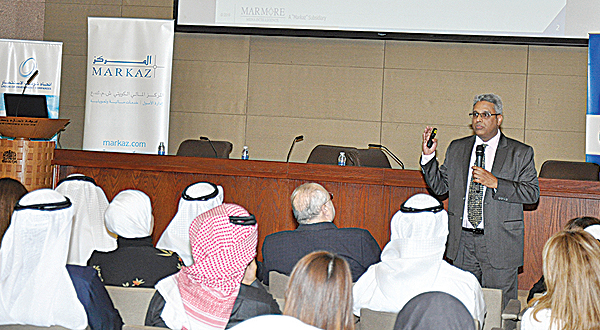Markaz research arm and UIC hold a presentation

KUWAIT: Kuwait Financial Centre 'Markaz' research arm, Marmore MENA Intelligence, organized a presentation in collaboration with The Investment Studies Center (ISC) at Union of Investment Companies (UIC) titled "Top 30 Stock Picks in GCC based on RODE Metrics" yesterday at Kuwait Chamber of Commerce & Industry. The presentation by M R Raghu, Head of Research at Markaz and Managing Director of Marmore, is based on a report by Marmore that revealed the portfolio of top 30 stocks identified using metrics such as ROIC (Return on Invested Capital) or ROE (Return on Equity), Dividend yield and Earnings yield (RODE) as stock filters/screens. It also dwelled on the back-testing results and highlighted how much an investor could have gained over the benchmark index through simple stock selection methods.
Raghu stated, "Businesses with strong fundamentals are most certain to weather the market volatility and build shareholder wealth in the long run. The scenario is no different when it comes to stock selection and building a portfolio. The stocks identified using RODE metric provide stocks with fundamentally strong businesses that could generate wealth, irrespective of the way the broader equity markets sway."
Raghu added, "In order to pick fundamentally strong stocks, it is vital that an investor is well-aware of metrics such as ROIC (Return on Invested Capital) or ROE (Return on Equity), Dividend yield and Earnings yield, that reflect the fundamental value of a company most appropriately irrespective of the direction equity markets take."
He pointed out, "Better performing businesses, in general, efficiently use their capital to generate healthy free cash flow and they do so consistently, which is measured by the financial metric ROIC for non-banking stocks and through ROE for banking stocks. We have considered those companies, which have consistently achieved ROCI/ROE over their weighted average cost of capital, as they add economic value."
Distribution of the cash flow generated to shareholders is measured by dividend yield and earnings yield as this helps one to determine the valuation of the stock on a relative basis when compared with its peers. The companies were subjected to other stock filters such as stocks that have a dividend yield of at least two-thirds of S&P MENA bond yield and whose earnings yield are at least twice that of the S&P MENA bond yields . Thus, the 'RODE' metrics shall help the investor to filter out stocks that are involved in efficient business operations, shareholder friendly and are not overvalued.
Companies that were shortlisted were further screened based on other parameters such as the free float, turnover ratio and market capitalization to ensure that the stocks have adequate liquidity and that a potential investor could take a position in the stock without impacting its price, to arrive at the list of GCC top 30 stocks.
While Marmore report exhibits 30 stocks, one example would be Dubai Islamic Bank, a large cap bank from UAE with a free float of 64.7 percent. The stock exhibited an average ROE of 16 percent during the period of assessment, commanded an average dividend yield of 6 percent and had an earnings yield of 15 percent. A dollar of shareholder's money invested at the beginning of 2013 in the company has increased over three times in 5 years and is worth over 3.37 dollars at the end of 2017.
Large cap stocks
The GCC top 30 RODE group consists primarily of large cap stocks and is well diversified in terms of sector. The group of stocks consists of 11 banks followed by four capital goods and materials companies each, and three real estate companies. Further, Marmore report has also analyzed the top 30 stocks in terms of market capitalization, both at the country level as well as at the broader industry level.
The report also does a comparative analysis of the performance of a portfolio consisting of top 30 RODE stocks with that of the S&P GCC index, a widely used equity benchmark for the region. On performing a back-test, the portfolio comprising of the top 30 RODE stocks returned 11.2 percent annually for the period 2013 to 2017 as against S&P GCC Index annualized return of 1.6 percent for the same period. The objective of this comparison is to show how stock selection using specific parameters could result in substantially higher returns as compared to the benchmark.
.jpg)



